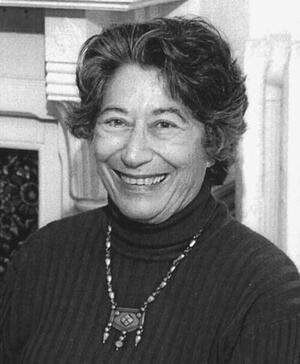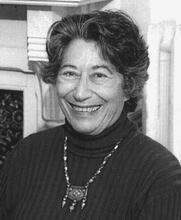Sylvia Rosner Rothchild
Sylvia Rothchild has used both fiction and nonfiction to explore the cultural identities of twentieth-century Jewish immigrants to the U.S., including the mass wave of Eastern European immigrants in the early part of the century, Holocaust survivors and emigrés from the Soviet Union.
Courtesy of Sylvia Rothchild
Sylvia Rosner Rothchild used her writing talents to turn oral history interviews with Holocaust survivors and Russian refuseniks into engaging accounts that challenged stereotypes and captured American mainstream audiences. She published her first novel, Sunshine and Salt, in 1964, and a collection of short stories, Family Stories for Every Generation, in 1990. She was best known for her collections of edited and polished oral history interviews, Voices from the Holocaust in 1981 and A Special Legacy: An Oral History of Soviet Jewish Émigrés in the United States in 1985. The powerful, vivid collections were praised for giving survivors the opportunity to describe their experiences in their own words. Alongside her writing, Rothchild played cello with the Boston Philharmonic Orchestra for years, beginning in 1974.
A prolific writer, Sylvia Rothchild has used both fiction and nonfiction to explore the complex interactions of American and Jewish cultures and identities among the descendants of Jews who arrived in the United States during the great wave of Eastern European immigration in the decades surrounding the turn of the twentieth century. Among the first writers to reshape for a general readership materials from oral histories collected from Holocaust survivors and emigrés from the Soviet Union, she also devoted much of her writing and lecturing to conveying individuals’ experiences of some of the great historical watersheds in modern Jewish life.
Early Life and Jewish Identity
Sylvia Rosner Rothchild was born on January 4, 1923, in Brooklyn, New York, to Bertha Newberger Rosner (1886–1965) and Samuel Lionel Rosner (1883–1968), both immigrants from the area of Vizhnitsa (Vijnita in Romanian and Vizhnits in Yiddish) fifty-six km WSW of Chernovsty. Growing up in a Yiddish-speaking family of parents and grandparents and in the thoroughly Jewish neighborhood of Williamsburg, Brooklyn, she developed a solid core of identification with Jewish people and history, in particular the world of Eastern European immigrants and the Europe they had escaped. Yet, like the protagonist of Anzia Yezierska’s Bread Givers, Sara Smolinsky, she was driven by a need to “make something” of herself, to embrace the intellectual and cultural life offered by an American education and to escape what she perceived as the narrow world to which a Jewish woman was expected to confine herself. A graduate of New York public schools, she worked her way through Brooklyn College, where she majored in science, revealing a pleasure in facts and objective observation that later came to be reflected in the carefully observed, concrete details of persons and places that characterize her fictions.
Although she worked at a variety of jobs, including supervising the X-ray department at a crystal laboratory during World War II, she early defined herself as a writer. She began publishing stories and essays in 1951, primarily in magazines with a connection to the Jewish community, such as Commentary, Hadassah Magazine, Present Tense and Moment. At the same time, she embarked upon the life of suburban homemaker and mother of children. Married in 1944 to Seymour Rothchild (1920–2001), a chemist, she moved with him after the war to the Boston area, where she became the mother of two daughters, Alice (1948) and Judith (1950) and a son, Joseph (1953). A cellist, she was a member of the Boston Philharmonic Orchestra from 1974.
Authorship and Legacy
Rothschild’s novel, Sunshine and Salt (1964), deals with the conflicts engendered in an artistically and intellectually talented and ambitious woman striving to live up to the expectations of married women in the middle-class suburbs of 1950s America, and with the internal and interpersonal struggles created by connection to the “old world” immigrant Jewish past while living fully in the purely “American” present. Using a first-person narrator, as she did in much of her fiction, Rothchild renders the clash of generations and cultures with both sharply etched detail and compassion. A volume of short stories, Family Stories for Every Generation (1990), collects twelve stories written in the 1950s and eight written in the 1980s. It provides a microcosm of Rothchild’s fiction, which conveys the interaction of generations and the reshaping of perception and feeling over time, especially between parents and children, with the frayed rope of Jewish connection frequently both theme and primary metaphor for interpersonal complexities.
Rothchild consistently used her abilities as a writer and teacher in the service of the Jewish community in its largest sense, for which she was honored by a number of organizations and institutions, including B’nai B’rith (Women’s Pacesetters Award, 1982), Hadassah (Women of Achievement Award, 1987), Brooklyn College (President’s Medal, 1991), and Hebrew College, Brookline, MA (Doctor of Hebrew Letters, honoris causa, 1992). In Voices from the Holocaust (1981), she shaped individual testimonies gathered in the William E. Wiener Oral History Library of the American Jewish Committee into one of the first volumes to convey a multitude of individual experiences with both immediacy and coherence, aiming to bring forward the survivors’ own voices so as “to counter the stereotypes and misconceptions that had burgeoned during the years of silence” (Rothchild, Voices, 14). Similarly, she used taped interviews with Soviet emigrés from the same source as well as her own interviews in A Special Legacy: An Oral History of Soviet Jewish Emigrés in the United States (1985), conveying the kind of history that can be found only in individual stories. Keys to a Magic Door (1959), a biography for children of the Yiddish writer I. L. Peretz, won the National Jewish Book Award in 1960. In newspaper and magazine articles and anthologized essays written over a fifty-year career, including over a thousand reviews of Jewish books written for the Boston Jewish Advocate, she articulated the interests and concerns of American Jewish life.
Sylvia Rosner Rothchild died on March 1, 2009.
Selected Works
Family Stories For Every Generation. Michigan: 1990.
A Special Legacy: An Oral History of Soviet Jewish Emigrés in the United States. New York: 1985.
Voices from the Holocaust. New York: 1981.
Sunshine and Salt. New York: 1964.
Keys to a Magic Door: Isaac Leib Peretz. New York and Philadelphia: 1959.
Papers of Sylvia Rothchild collected in the Twentieth Century Archive of the Mugar Library at Boston University, Boston, MA.




